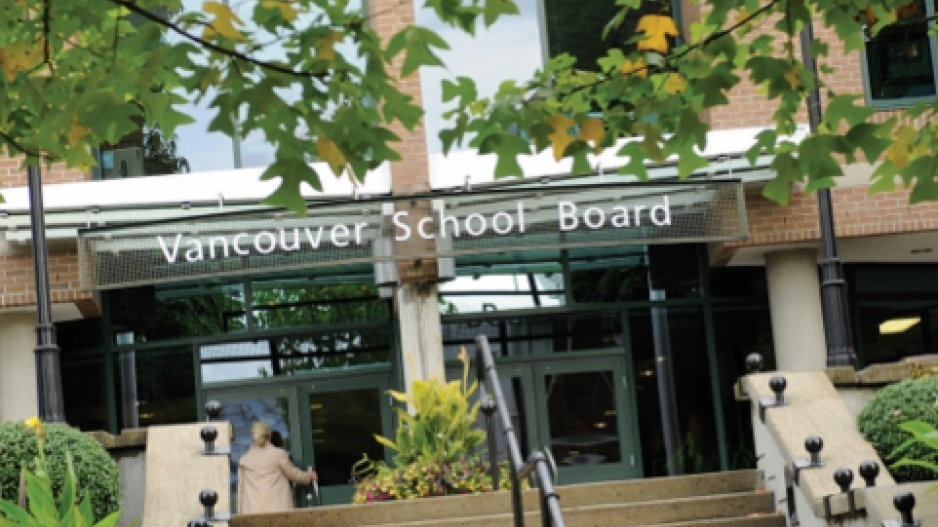A report for Education Minister Mike Bernier on the Vancouver School Board said it missed opportunities for millions of dollars that would have helped balance its budget.
The Oct. 28-released report by former Deputy Finance Minister Peter Milburn and EY pointed to refusals to sell Kingsgate Mall or to take grants from Chevron, as well as the continued free parking for teachers and the restriction of selling surplus property and leasing unused properties.
“This appears to be a completely entrenched approach to running the business of the School District,” the report said.
The school board has 5,330 full-time equivalent staff, representing 92% of the operating budget. There are 13 independent collective agreements with workers, not including that with the B.C. Teachers’ Federation. “No other school district in the province faces this level of complexity or constraint,” the report said.
At the root of the problem is the politicization of the board, according to the report. EY sampled voting records and found members of Vision Vancouver and NPA voted along party lines over 95% of the time. It said the board micromanaged the school district, interfering with management’s ability to operate the organization, “causing an unsustainable amount of stress on members of VSB management.”
“The party system that exists in Vancouver municipal politics may create strong alignment within parties, but that, along with the differences in the trustees’ view of their role, appears to also exacerbate the interpersonal conflicts between some trustees at the VSB.”
Six senior managers took emergency medical leave and WorkSafeBC began an investigation. It led to the Oct. 3 suspension of a process gauging whether to close schools on a list of 11. The 2014-elected School Board was eventually fired Oct. 17 for failing its legislated duty to pass a balanced budget. Only two other school boards had been fired since 1995, both for submitting deficit budgets. Dianne Turner was appointed trustee.
Vision Vancouver lost its majority in the 2014 election, but Green trustee Janet Fraser held the balance of power and sided with Vision. The Vision school board campaign spent $682,110.76 transferred from central party coffers in the 2014 campaign, including $156,746.09 in salaries and wages. Vision raised more than $3.41 million for the 2014 civic election. Vision has not published its 2015 fundraising report.
Less than two weeks before Vision and Fraser voted against the proposed budget last spring, a meeting was held in the office of Mike Magee, then-Mayor Gregor Robertson’s chief of staff and the de facto head of Vision Vancouver. The April 15 entry in Magee’s calendar said the meeting was about “VSB communications.” It does not say who attended. Vision’s city council, park board and school board members have been known to hold joint caucus meetings.
The report recommended VSB engage with [Kingsgate Mall leaseholder] Beedie Development Group “to develop an alternative approach to the lands to realize the underlying market value associated therewith, which we estimate at an amount not less than $120 million.” The Vision members opposed the notion of selling the mall, because it brings in $750,000 a year in lease revenue.
The EY report found a $1 million accounting error in 2015-2016 that could have been identified and resolved by the board “if it was properly constituted.” EY recommended the board strike an audit committee. It said most trustees do not have a financial management background nor have they sought professional development. Additionally, the board also lacks performance measurement at the top levels.
EY was notified by the Education Ministry that the accumulated operating surplus was underestimated by at least $1 million.
“In the last three fiscals, expenses have exceeded or will exceed revenues,” the report said. “To create a balance on their income statement, the district has relied on drawing down the operating surplus from previous years. Unlike most corporations, this unique tactic is permitted for school districts. To be clear, this is akin to running down savings account to pay for day-to-day expenses; it is not a sustainable way to achieve budgetary balance.”
Last November, VSB contracted consultant Modus Planning Design & Engagement Inc. for $78,750 to provide strategic planning after a public tendering process. It also hired a contractor on a no-bid contract to work on the consultation process for the proposed closure of schools for as much as $400,000. Vision School Board chairman Mike Lombardi refused to disclose the name of the company and declined multiple interview requests from Business in Vancouver on the topic, before and after he was fired. Likewise for fellow Vision trustee Patti Bacchus, who referred BIV to the school board’s Freedom of Information office.
BIV confirmed independently that the contract was given to Context Research, but the company’s principal, John Forsdick, did not respond for comment.
Tendering rules in B.C. require publicly advertised competitions for contracts over $75,000, unless a public body can demonstrate urgent or unique need.
The Office of the Information and Privacy Commissioner has consistently ruled that contract information cannot withheld from the public. In July 2013, then-Commissioner Elizabeth Denham recommended proactive disclosure of contract information. Last spring, the provincial government began publishing monthly lists of its no-bid contracts.
VSB had pondered the fate of 11 schools that were proposed for closure by 2017-2018. The report said it would save $4.7 million in facilities costs and generate $3.9 million in potential rental revenue. It estimated the savings from 2018-2019 to 2030-2031 would be $78.08 million. But five of the 11 schools were also deemed high risk of major damage in case of a major earthquake and would have cost as much as $168 million to upgrade 10 of them (work on Pierre Elliott Trudeau Elementary is complete).




